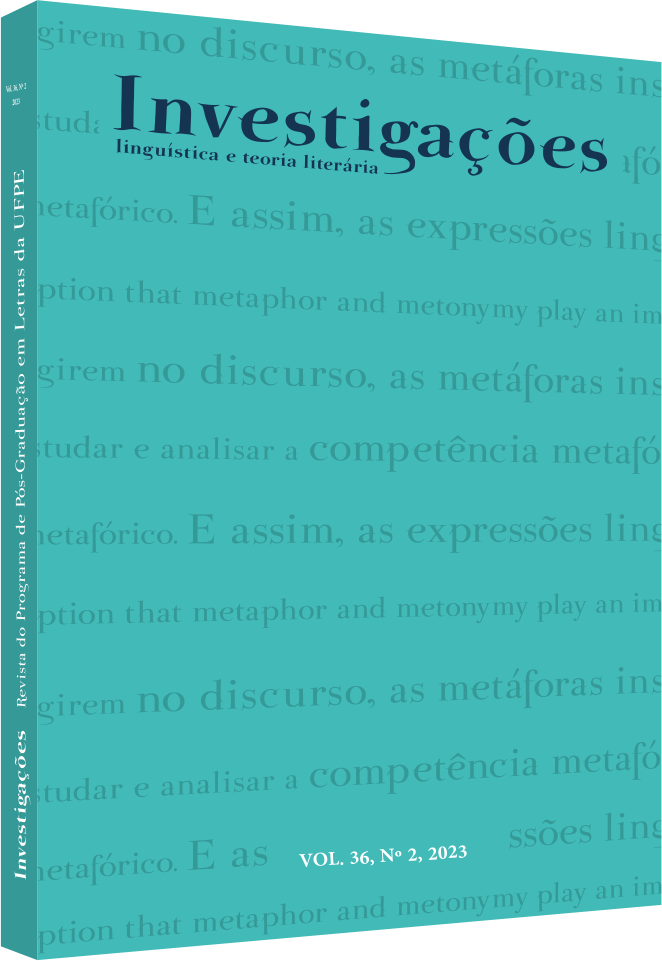Irritation, criticism and harshness in online interactions: a study on the sociointeractional functioning of impoliteness in multiplayer electronic games
DOI:
https://doi.org/10.51359/2175-294x.2023.260386Keywords:
(im)politeness, online interactions, multiplayer electronic gamesAbstract
Based on the recurring belief that "aggressive discourse" is a fundamental part of interaction in online video games, this study investigated how interaction amongst multiple players on the same team functions. The aim was to analyze how interactants develop collective strategies through mechanisms of (im)politeness. A qualitative-interpretative methodology was employed, and the choice of the game League of Legends was made due to its widespread recognition as the most representative in the realm of competitive gaming. The results indicated that, when negotiating roles/functions in conflict situations, interactants were compelled to develop strategies for maintaining harmony in the interaction.
References
BARR, Pippin; NOBLE, James; BIDDLE, Robert. Video game values: human–computer interaction and games. Interacting with Computers, [s. l.], v. 19, p. 180–195, 2007.
BARRETO FILHO, Ricardo Rios. Avaliações da (im)polidez em interações no Facebook. 2019. Tese (Doutorado em Letras) – Centro de Artes e Comunicação, Universidade Federal de Pernambuco, Recife.
BARRETO FILHO, Ricardo Rios; NEVES, Herbertt; BARROS, Kazue Saito Monteiro de. Impolidez em textos on-line no facebook: análise das escolhas lexicais numa perspectiva textual-interativa. Calidoscópio, [S. l.], v. 17, n. 3, p. 433–452, 2019.
BARRETO FILHO, Ricardo Rios; BARROS, Kazue Saito Monteiro de. Impolidez e identidades em uma interação on-line no facebook: uma abordagem sociodiscursiva. Linguagem em (Dis)Curso, [s. l.], v. 21, n. 1, p. 135-149, abr. 2021.
BARTON, David. Literacy: an introduction to the ecology of written language. 2. ed. Oxford: Blackwell, 2007.
BARTON, David; LEE, Carmen. Language online: investigating digital texts and practices. Abingdon: Routledge, 2015.
BERKER, Thomas; HARTMANN, Maren; PUNIE, Yves; WARD, Katie. (eds.). Domestication of media and technologies. Maidenhead: Open University Press, 2005.
BROWN, Penelope; LEVINSON, Stephen. Politeness: some universals in language usage. Cambridge: Cambridge University, 1987 [1978].
CAMPOS, Aline de. Escalada do conflito em processos colaborativos online: uma análise do verbete web 2.0 da Wikipédia. Intexto, Porto Alegre, v. 1, n. 22, p. 134-150, jan./jun. 2010.
COULON, Alain. Etnometodologia. Tradução: Ephraim Ferreira Alves. Petrópolis: Vozes, 1995.
CULPEPER, Jonathan. Impoliteness: using language to cause offence. Cambridge: Cambridge University Press, 2011.
FRASER, Bruce; NOLEN, William. The association of deference with linguistic form. International Journal of the Sociology of Language, [s. l.], n. 27, p. 93-109, 1981.
GOFFMAN, Erving. A representação do eu na vida cotidiana. 20. ed. Tradução: Maria Célia Santos Raposo. Petrópolis: Vozes, 2002 [1975].
LIUKKONEN, Ina. Managing hate speech in gaming media. Los Angeles: BrandBastion, 2018. Disponível em: https://info.brandbastion.com/hate-speech-in-the-gaming-community-and-social-media. Acesso em: 28 ago. 2023.
MARCUSCHI, Luiz Antônio. Análise da Conversação. 5. ed. São Paulo: Ática, 2003.
MCLUHAN, Marshall. The medium is the massage. Harmondsworth: Penguin Books, 1967.
PRETI, Dino. Alguns problemas interacionais da conversação. In: PRETI, Dino. Interação na fala e na escrita. 2. ed. São Paulo: Humanitas/FFLCH/USP, 2003.
PRIMO, Alex. Conflito e cooperação em interações mediadas por computador. Contemporânea: Revista de Comunicação e Cultura, [s. l.], v. 3, n. 1, p. 38-74, jun. 2005.
SACKS, Harvey; SCHEGLOFF, Emanuel; JEFFERSON, Gail. A simplest systematics for the organization of turn-taking for conversation. Language, [s. l.], v. 50, n. 4, p. 696-735, 1974.
SANTANA, Gabriel. A (im)polidez como mecanismo de (des)organização na interação em jogos eletrônicos on-line. 2022. Dissertação (Mestrado em Letras) – Centro de Artes e Comunicação, Universidade Federal de Pernambuco, Recife.
SPENCER-OATEY, Helen. (Im)politeness, face and perceptions of rapport: unpackaging their bases and interrelationships. Journal of Politeness Research, [s. l.], v. 1, n. 1, p. 95-119, jul. 2005.
SPENCER-OATEY, Helen. Managing rapport in talk: using rapport sensitive incidents to explore the motivational concerns underlying the management of relations. Journal of Pragmatics, [s. l.], v. 34, p. 529-545, 2002.
STENROS, Jaakko; PAAVILAINEN, Janne; MÄYRÄ, Frans. Social interaction in games. International Journal of Arts and Technology, [s. l.], v. 4, n. 3, p. 342-358, 2011.
WATTS, Richard. Politeness. Cambridge: Cambridge University, 2003.
ZAGO, Gabriela. Trolls e jornalismo no Twitter. Estudos em Jornalismo e Mídia, Florianópolis, v. 09, n. 1, jan-jul. 2012.
Downloads
Published
How to Cite
Issue
Section
License
Copyright (c) 2024 Gabriel do Nascimento Santana, Ricardo Rios Barreto Filho, Sônia Virginia Martins Pereira

This work is licensed under a Creative Commons Attribution 4.0 International License.
Authors who publish with Revista Investigações agree to the following terms:
Authors retain copyright and grant the journal right of first publication with the work simultaneously licensed under the Creative Commons Attribution 4.0 International (CC BY 4.0) license that allows others to share the work with an acknowledgement of the work's authorship and initial publication in this journal.
Authors are able to enter into separate, additional contractual arrangements for the non-exclusive distribution of the journal's published version of the work (e.g., post it to an institutional repository or publish it in a book), with an acknowledgement of its initial publication in this journal.
You are free to:
Share — copy and redistribute the material in any medium or format for any purpose, even commercially.
Adapt — remix, transform, and build upon the material for any purpose, even commercially.
The licensor cannot revoke these freedoms as long as you follow the license terms.
Under the following terms:
Attribution — You must give appropriate credit , provide a link to the license, and indicate if changes were made . You may do so in any reasonable manner, but not in any way that suggests the licensor endorses you or your use.
No additional restrictions — You may not apply legal terms or technological measures that legally restrict others from doing anything the license permits.

